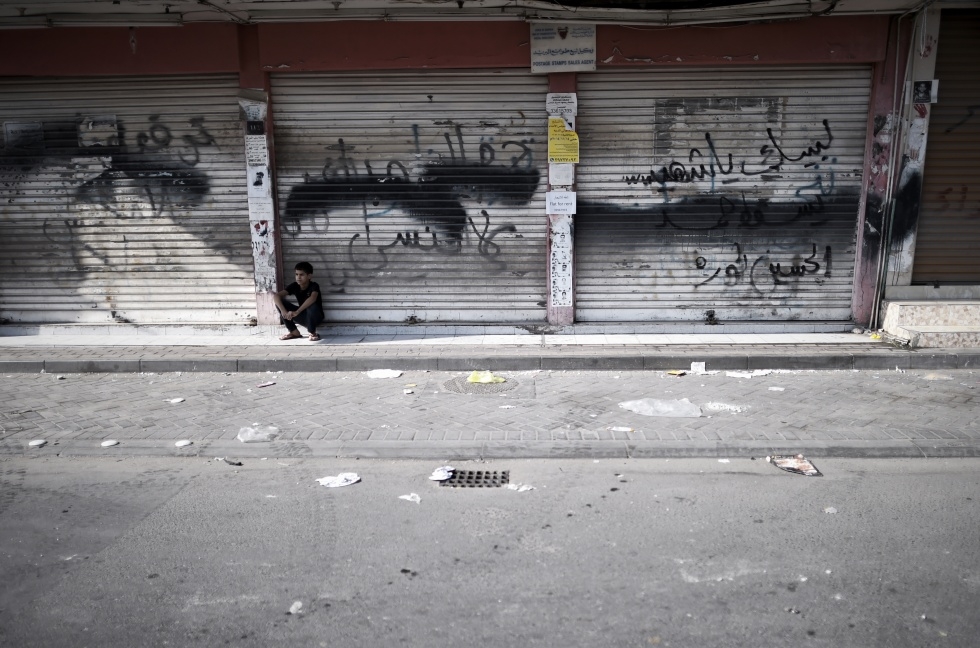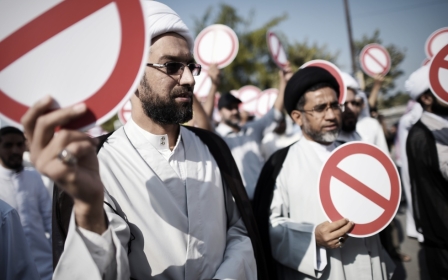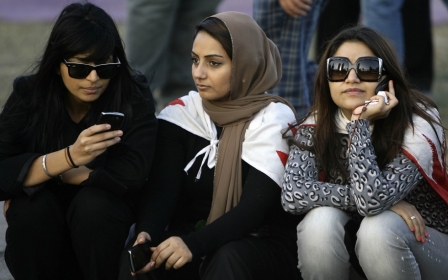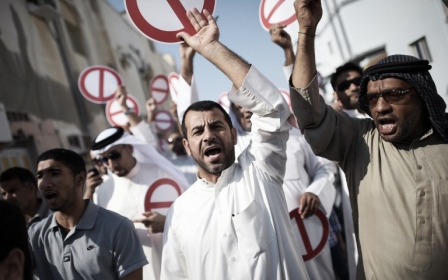Bahrain’s elections a closed shop for migrant workers

Saturday’s parliamentary elections in Bahrain, the first since 2002, have placed great emphasis on transparency and encouraging voter turnout, with the government offering to enter those who go to the polls into a prize draw for an iPhone 6.
In a drive towards greater accessibility, Bahrain’s electoral commission has published a list of all the 266 candidates standing in the country’s four governorates. A pro-elections campaign group, Citizens for Bahrain, has even sought to outline the political stances of all those standing.
But no matter how high the turnout and how vocal the campaign groups, one significant portion of the population will be excluded from the ballot. Migrant workers, who by the latest estimations officially make up some 55 percent of the population, will not have a vote on Saturday.
Economically active, politically disenfranchised
Of all the Gulf States, Bahrain has one of the lowest proportions of migrant workers - only Oman relies less on imported labour. But the numbers of non-Bahrainis working in the country are on the rise, as is the extent to which they prop up the economy.
However, the economic contribution of migrant workers does not translate seamlessly into political engagement, despite the patchy rights afforded them by Bahrain’s legal system. Rob Franklin wrote in 1985 that expatriates in Bahrain live in “well-structured insecurity” – despite decades of partial reform, migrant workers on the whole remain shut out of the political conversation.
Language, as well as the feeling of insecurity, proves a key stumbling-block. Many of Bahrain’s foreign workers hail from countries like Nepal, India and Pakistan and most have not completed primary education. According to rights groups, huge numbers of workers in Bahrain speak little or no Arabic, and only contracts written in Arabic are widely recognised.
Among transient low-income labourers, who make up the majority of non-national workers, the separation from Bahraini society is geographical as well as linguistic.
“Migrant labourers are segregated from the rest of the community,” according to Justin Gengler, a senior researcher at Qatar University and editor of the blog Religion and Politics in Bahrain. “The labour camp populations based in the far south of the country are segregated physically and politically” from the rest of society, making it near impossible to have a voice in mainstream political discussions.
Migrant workers can, though, access one political platform: non-nationals can join labour organisations, and even run for office in Bahraini unions. However, analysts have so far seen little co-ordination between Bahrainis and non-nationals within the country’s unions.
“Expatriates are not vying with nationals for dominance in a specific union. In fact, they have set up their own institutions that aim to challenge the more-established organisations,” Gengler told MEE.
Since non-nationals do not have a vote, any campaigning done within their unions is unlikely to have a noticeable impact.
“To the extent that [non-national unions] have real policy agendas, they cannot be translated into political action. Instead, it is an example of expatriates being used as an apolitical blocking tool to take up space and provide a reliably pro-government bloc of support.”
Stumbling reforms and political deadlock
The exclusion of migrant workers from mainstream politics does not mean, however, that their treatment is not a hot-button political issue in Bahrain, not least because of increasing awareness among Bahrainis.
“The general public is now increasingly aware of the issues surrounding migrant labour,” according to Beverley Hamadeh, general secretary of Bahrain-based NGO the Migrant Workers Protection Society.
Bahrain garnered praise in 2009 when it became the first Gulf state to abolish the much-criticised kafala system, which required migrant workers to be tied to a “sponsor”, usually their employer, for a minimum of two years after their arrival.
However, in reality the system was never reformed, and kafala remains firmly in place. Many in the business community objected to the change, which would have meant they were forced to pay extra recruitment fees. Under pressure, the government eventually back-tracked; by 2014, the only reform to be implemented is that workers are now tied to their employers for 12 instead of 24 months.
Further reforms aimed, according to Gengler, at replacing migrant workers with nationals have also faltered. A 2008 tax on employing non-national workers was scrapped in 2011, in another nod to Bahrain’s sizable business community.
Since 2011, the political landscape surrounding the issue has shifted significantly. Prospects for further reform of the migrant labour system are tied to the political fortunes of Crown Prince Salman, the man who brought reforms to the table. Since a failed bid to broker a settlement with the opposition in March 2011, Salman’s authority has been on the wane, and with him, “the forces behind migrant labour reforms,” according to Gengler.” In this climate, analysts say, the political feasibility of further reform of the migrant labour system is uncertain. “Certainly none of [the Gulf States] want to see the lowest level of labourers working in horrible conditions - or to see those horrible conditions reported on the international level,” according to David Mednicoff, director of Middle Eastern Studies at the University of Massachusetts.
However, “the legislative environment is now more constrained generally”, with rulers under pressure not only because of domestic political forces but also due to unrest in the region. Governments in the area “have a more complex balance to strike among their different constituencies, their basic political stability and the broader international legal climate.”
‘Cheapening’ of Bahraini citizenship
Though there may be little appetite among Bahrain’s rulers for a focus on migrant labour, another aspect of the issue could be about to explode onto the mainstream political agenda: political naturalisation. Activists have long alleged that authorities have embarked on a campaign to naturalise non-nationals who will be supportive of the government and act as a bolster against a wave of domestic protest.
Nationals from across the Arab world, and some 250 British, have been granted Bahraini citizenship, and for years there have been reports of large numbers of nationals from Yemen, India and Pakistan being naturalised so that they can legally work in Bahrain’s security services.
“The cheapening of Bahraini citizenship is a big issue,” Gengler said, and it could now unite Bahrainis from across the political spectrum. “The end of political naturalisation, the end of corruption - these are issues that both Sunnis and Shiites can get behind. But whether that means they could ever join together for a united protest movement is a different question entirely.”
Scope for change?
Despite its broken promises on reforming the kafala system, the government has, according to rights groups, made some progress on protecting non-national workers. In 2012, Bahrain’s decades-old Labour Law was reformed, and for the first time it defined domestic staff like cleaners and house-maids, the vast majority of whom are migrant women, as workers. This decision entitles domestic workers to greater protections, annual leave and mediation in labour disputes.
However, the reformed law was criticised over its obvious flaws. Domestic foreign workers are still not granted the same weekly rest days and mandatory limits on hours of work as other categories of workers - and there is still no minimum wage for migrant workers.
Despite problems with implementation, Hamadeh of the Migrant Workers Protection Society remains cautiously optimistic about the prospects for further reform.
“Unfortunately, the vast majority of domestic workers here are unaware of these changes to the law - they are rarely aware of their rights at all. Sponsors are also unaware of the law when it comes to the domestic workers they employ. But the reform of the labour law is definitely a step in the right direction.”
But amid attempts to balance the demands of their different constituencies, not to mention rising fears over Islamic State operatives working within the security services, the country’s rulers may have bigger fish to fry than reforming migrant labour laws.
“The pressures that Gulf States are under now are so much more direct and diverse,” Mednicoff said. “Bahrain is between a rock and a hard place.”
New MEE newsletter: Jerusalem Dispatch
Sign up to get the latest insights and analysis on Israel-Palestine, alongside Turkey Unpacked and other MEE newsletters
Middle East Eye delivers independent and unrivalled coverage and analysis of the Middle East, North Africa and beyond. To learn more about republishing this content and the associated fees, please fill out this form. More about MEE can be found here.




